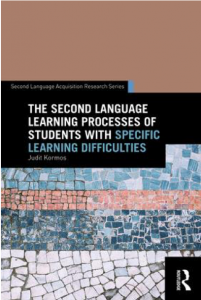Books

Kormos, J., & Smith, A. M. (2023). Teaching foreign languages to learners with specific learning differences. Bristol. Multilingual Matters.
Kormos, J. (2017). The second language learning processes of students with specific learning difficulties. New York Routledge.
Kormos, J., & Kontra, E. H. (Eds.). (2008). Language learners with special needs: An international perspective. Bristol: Multilingual Matters.
Martin, D. (2013). Researching dyslexia in multilingual settings diverse perspectives. Clevedon: Multilingual Matters.
Nijakowska, J. (2010). Dyslexia in the foreign language classroom. Bristol: Multilingual Matters.
General research overview articles
Kormos, J. (2020) Specific learning difficulties in second language learning and teaching. Language Teaching, 1-15.
Kormos, J. (2017). The effects of specific learning difficulties on processes of multilingual language development. Annual Review of Applied Linguistics, 37, 30-44. (open access)
Kormos, J., & Taylor, L. B. (2020). Testing the L2 of learners with specific learning difficulties. In P. Winke & T. Brunfaut (Eds.), The Routledge handbook of second language acquisition and language testing (pp. 413-421). Routledge.
Research articles
Eberharter, K., Kormos, J., Guggenbichler, E., Ebner, V. S., Suzuki, S., Moser-Frötscher, D., … & Kremmel, B. (2023). Investigating the impact of self-pacing on the L2 listening performance of young learner candidates with differing L1 literacy skills. Language Testing, 40, 960-983
Indrarathne, B. (2019). Accommodating learners with dyslexia in English language teaching in Sri Lanka: Teachers’ knowledge, attitudes, and challenges. TESOL Quarterly, 53(3), 630-654.
Kormos, J., Košak Babuder, M., & Pižorn, K. (2019). The role of low-level first language skills in second language reading, reading-while-listening and listening performance: A study of young dyslexic and non-dyslexic language learners. Applied Linguistics, 40(5), 834-858. (open access)
Košak-Babuder, M., Kormos, J., Ratajczak, M., & Pižorn, K. (2019). The effect of read-aloud assistance on the text comprehension of dyslexic and non-dyslexic English language learners. Language Testing, 36(1), 51-75. (open access)
Kormos, J., & Nijakowska, J. (2017). Inclusive practices in teaching students with dyslexia: Second language teachers’ concerns, attitudes and self-efficacy beliefs on a massive open online learning course. Teaching and Teacher Education, 68, 30-41. Link to pre-print version: https://eprints.lancs.ac.uk/id/eprint/87462/1/moocsurveyarticleforPURE.pdf
Kormos, J., & Csizér, K. (2010). A comparison of the foreign language learning motivation of Hungarian dyslexic and non‐dyslexic students. International Journal of Applied Linguistics, 20(2), 232-250.
Csizér, K., Kormos, J., & Sarkadi, A. (2010). The dynamics of language learning attitudes and motivation: Lessons from an interview study of dyslexic language learners. The Modern Language Journal, 94(3), 470-487.
Kormos, J., Csizér, K., & Sarkadi, A. (2009). The language learning experiences of students with dyslexia: Lessons from an interview study. International Journal of Innovation in Language Learning and Teaching, 3(2), 115-130. Link to pre-print version: https://eprints.lancs.ac.uk/id/eprint/26783/1/dyslexic_language_learners-illtrev.pdf
Nijakowska, J. (2019). Foreign language teachers’ preparedness to cater for special educational needs of learners with dyslexia: A conceptual framework. European Journal of Special Needs Education, 34(2), 189-203. DOI: 10.1080/08856257.2019.1581401
Nijakowska, J., Tsagari, D., & Spanoudis, G. (2018). English as a foreign language teacher training needs and perceived preparedness to include dyslexic learners: The case of Greece, Cyprus and Poland. Dyslexia: An International Journal of Research and Practice, 24(4), 357-379. DOI: 10.1002/dys.1598
Research reports
Kormos, J., & Ratajczak, M. (2019). Time Extension and the Second Language Reading Performance of Children with Different First Language Literacy Profiles. London : The British Council, 2019. 30 p. (ARAGs Research reports) Open access